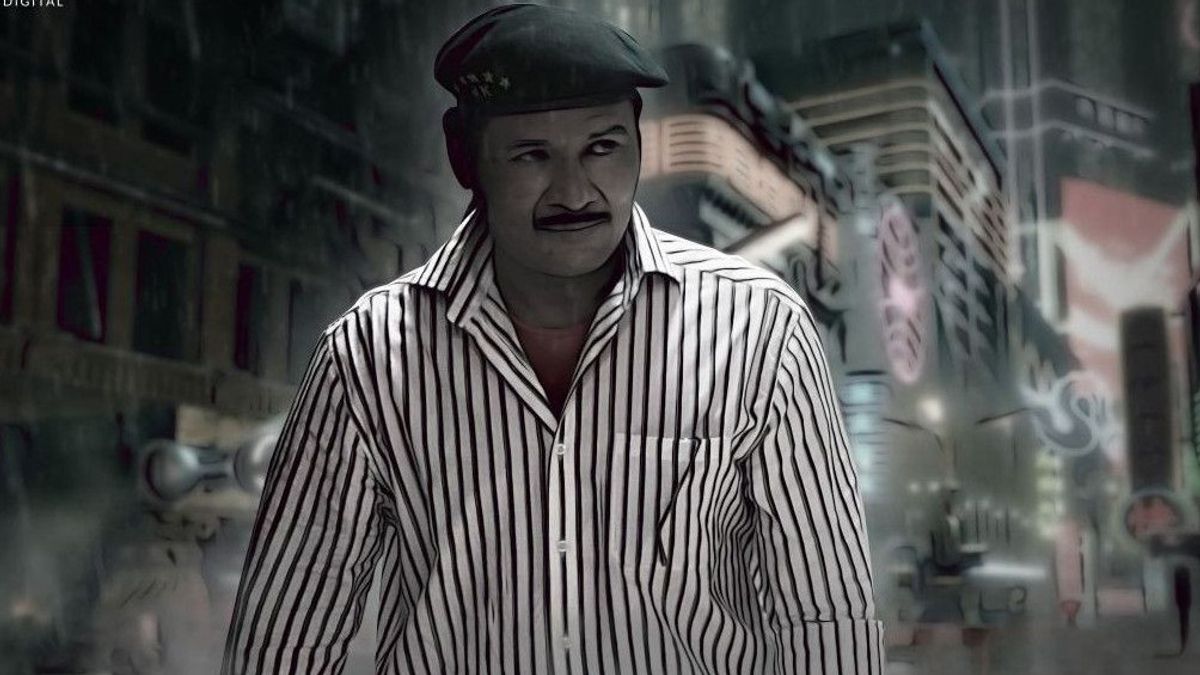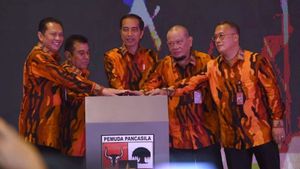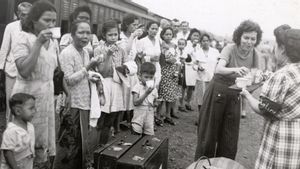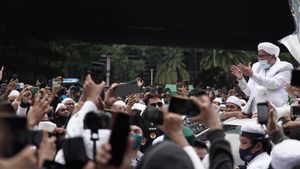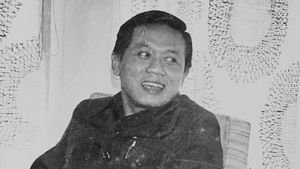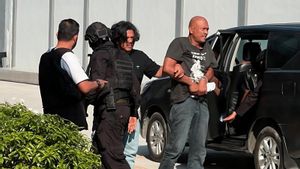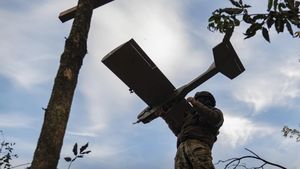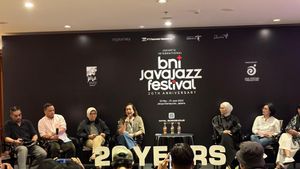JAKARTA - Profession as a debt collector has a long history. Various ethnic groups often clash. The Moluccan ethnicity is the most prominent. Their work can not be separated from the history of competition between John Kei and Basri Sangaji.
The two are not the first. But the big name of the clan brains from Kei and Haruku Islands perpetuated the image of a debt collector belonging to Jong Maluku, especially in the capital city. And the presence of ethnic Maluku in Jakarta has been present since the Dutch colonial era.
This ethnic group was brought by the Dutch colonial government which required a lot of manpower to build Batavia (Jakarta). In Batavia, the Moluccans had special privileges, especially those who were Christians. The privilege is in the form of giving jobs and land.
We even know one village whose name is taken from the ethnic group in Maluku: Kampung Ambon. The religious closeness between the Dutch and the Moluccans made Batavia the second home for people from an area called the Land of a Thousand Islands.
They filled many vital jobs to turn the wheels of the economy in Batavia. Not only that. Many of the Moluccan youths were also recruited by the Dutch to become Dutch defenders. For example, when the Dutch began to prepare themselves against Japan in the 1940s.

At that time many Moluccans were recruited as troops of the Dutch army, the Koninklijk Nederlandsch-Indische Leger (KNIL). "In several places, for example, Surabaya, Jakarta, Malang, and Makassar there are Ambon Camps (they are Dutch KNIL soldiers and their descendants) the number is currently estimated to be close to more than one million people".
"From that number, it is estimated that in Jakarta there are approximately 750,000 Ambonese Christians. A realism that promises a lot of Ambonese Christian youths, because many of them have the opportunity to become artists, sportsmen, and sailors, as well as the debt collector service sector", said John Pieris in the book Tragedi Maluku: Sebuah Krisis Peradaban (2004)
After Indonesia's independence, the number of Moluccans in Jakarta increased. At that time, the professions occupied by the Moluccans – from what was initially dominated by unskilled workers in Jakarta's economic barns such as Tanjung Priok – became more diverse.

The fruit of the diversity of professions gave rise to groups of thugs who came from the Maluku people. The thug group was formed by the processes of exclusion and migration. One of them grew rapidly because of the religious conflict in Maluku in 1999.
The conflict spearheaded the massive migration of Moluccan youth to the capital city of Jakarta. "The group from eastern Indonesia known as the Ambon group developed after the religious conflict in Maluku in 1999. At that time, many Maluku people moved to Jakarta because of economic problems".
"In the capital city, these people from Maluku work to secure entertainment venues or companies. They grow because someone uses their services," said Director of General Crime Investigation of the Greater Jakarta Metropolitan Police, Tubagus Ade Hidayat, quoted by Hussein Abri Dongoran et al in their writings in the Tempo magazine entitled Hujan Tinju Anak Baru (2020).
Charisma of John Kei and Basri Sangaji
In the 1990s, ethnic groups emerged one after another. In addition to the good Betawi gangs, Maluku, Flores, and Timor gangs also appeared. They have the same mission, which is to find opportunities to live by working in Jakarta. What is most memorable is the appearance of two charismatic figures from Maluku.
They are the John Kei clan, which represents Kei Island, and the Basri Sangaji clan, which represents Haruku Island. These two clans paved the way for many fellow clans (islands) to live in a solidarity network in the capital city.
“The Kei clan, in particular, from Kei Island, Ambon has carved its own niche in the world of debt collection services. They compete with fellow Ambonese clans, such as Sangaji, the Flores gang, Thalib Makarim, and the East Timorese Hercules network".
"The relationships between clans and regions of origin are often complicated by business competition, overlapping client bases for their services, and fragile ideas of loyalty and honor. Which has led to the bloodiest and most violent gang violence", added Ian Douglas Wilson in the book Politik Jatah Preman: Ormas dan Kuasa Jalanan di Indonesia Pasca Orde Baru (2018).
The war between the gangs - especially the enemies of the Kei clan and the Sangaji clan - has even been raging since the late 1990s. The estuary is the struggle for power and employment. As a result, dozens of people died on both sides.
In the Sangaji clan, Basri Sangaji himself became the victim of a gang war with John Kei in 2004. From the Kei clan, John Kei's younger brother, Tito Refra Kei was killed by a mysterious shooter in 2013. Even so, the gang war also helped legitimize the image of the debt collection business as belonging to both Moluccan groups.
Big names John Kei and Basri Sangaji
Often large companies use debt collection services belonging to John Kei and Basri Sangaji to make these two names famous. As a result, the forest collection business became increasingly synonymous with the Moluccans, even though John Kei was in prison.
John Kei was imprisoned for the murder of the Director of PT. Sanex Steel, Harry Tantono in 2012. While Basri Sangaji passed away in 2004. Regardless, their big names still resonate in the world of debt collectors. The business is still running with both big names.
One of John Kei's subordinates, Denny Ouw, proudly shared his close relationship with John Kei before he was imprisoned in 2012. Thanks to John Kei's trust, Denny was able to earn around IDR 30 million per month.

At that time, Denny became a caretaker and the ruler of the parking lot in the area of Ujung Menteng (East Jakarta) to Harapan Baru (Bekasi). Since then, Denny has often sold the name John Kei. Even though he was independent with his own group, he still carried the name John Kei.
The big-name John Kei is very "effective" in perpetuating work, ranging from small to large-scale debt collection. After John Kei was imprisoned, Denny prepared a strategy to recruit new members to expand the business. John Kei's name is again a "lucky charm."
“Denny recruited dozens of new members after John Kei was imprisoned for being accused of being involved in the murder of Tan Hary Tantono alias Ayung in January 2012. Currently, he is the Commander of Maluku Pusat Satu Rasa Salam Sarane. His 'power' area covers various areas in DKI Jakarta. Together with his members, Denny carried out various jobs. These include debt collectors, towing vehicles with bad credit, and debt collectors. He said his profession is a freelance collector", concluded Mustafa Silalahi et al in their article in Tempo Magazine entitled Baku Bacok Kerabat Tanah Kei (2020).
*Read other information about NUSANTARA HISTORY or read other interesting articles from Detha Arya Tifada.
Other MEMORIES
SEE ALSO:
The English, Chinese, Japanese, Arabic, and French versions are automatically generated by the AI. So there may still be inaccuracies in translating, please always see Indonesian as our main language. (system supported by DigitalSiber.id)
